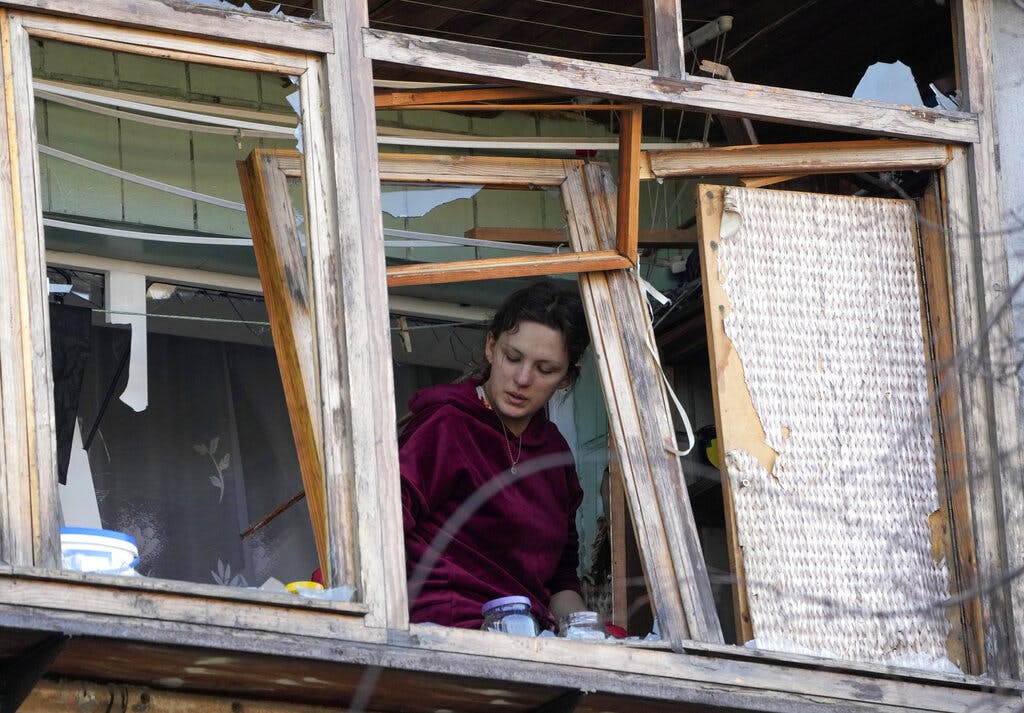As Multitudes Flee War, Many Ukrainians Stay, Ready to Fight
Ukraine ‘is my home. I don’t want to leave. This is my country. Where else should I go?’

LVIV, Ukraine — As the conflagration in Ukraine expands to the country’s west, millions flee westward in what is now the greatest refugee crisis Europe has faced since World War II.
Nearly 2.7 million Ukrainians have left the country since the Russian military invasion began on February 24, according to the latest figures published by the United Nations High Commissioner for Refugees.
This covers just two and a half weeks of fighting. Ultimately four million people, or 10% of the population, could leave the country, the United Nations estimates.
Many hundreds of thousands of people have traveled westward through Lviv, Ukraine’s third city and the largest in the country’s west. Trains from Ukraine’s east bring passengers onward to Moldova, Romania, Hungary, and Slovakia.
Most — more than 1.7 million and counting — are heading to Poland, and some onward to Germany. Despite this exodus, some Ukrainians are deciding to stay — and if necessary, to fight for Ukraine.
Daria Ivanova, a tattooed English teacher and translator in her early 30s, has traveled the world. After 10 years and 36 countries, though, she felt a calling and came back to her hometown in western Ukraine late last year.
When Russia launched its offensive last month, Ms. Ivanova’s Ukrainian friends in western Europe urged her to leave. Ukraine “is my home,” she said, exclaiming: “I don’t want to leave. This is my country. Where else should I go?”
Ms. Ivanova is well aware of the ruthlessness of the Russian war machine. Information shared widely online and via social media is rife with scenes of destruction and gives Ukrainians an unvarnished view of the war.
Although the conflict has thus far been largely confined to the nation’s capital and eastern regions of the country, that changed Sunday morning when a barrage of Russian missiles struck targets deep in the west, shattering the region’s perception of safety.
The Ukrainian military today is a far cry from its dilapidated state during the 2014 Russian invasion and annexation of Crimea. Anti-tank and anti-aircraft weapons from the west, combined with training and the adoption of some NATO military standards, are exacting a bitter toll on Russia’s invasion force. Estimates of Russian losses range between 6,000 and 12,000 troops in the first few weeks of the fighting. Iin the deadliest year of the Vietnam war, 1968, America suffered roughly 1,400 combat deaths a month.
Not only are the Ukrainians better trained and armed than they were eight years ago, they are also defending their homeland. Locked in an existential struggle with Russia, Ukrainians are finding that their morale is high.
A lithe 35-year-old marathon enthusiast who identified himself only as Anton compared the conflict in his country to a daydream that he expected to wake up from.
The war “is real, but it is not real,” he explained, adding that he struggles to come to terms with a new wartime reality. He is from a small town in eastern Ukraine.
When asked if he, too, would defend Lviv and fight the Russians, he looked curiously at his hands. “I have never shot an AK-47, an AK-74, or even a Makarov [pistol],” he said.
“I wouldn’t be a front-line soldier, or even in the second line,” he explained, given his lack of military experience. He could help however, “back, behind, in the fourth line of defense.”
Damien Margrou, a Norwegian citizen and newly minted corporal in Ukraine’s all-volunteer International Legion, has lived in Ukraine for the past two years. Although nearly all his friends and colleagues left in the days and weeks leading up to the renewed Russian push, he enlisted. “I couldn’t bring myself to leave,” he explained. “It would be letting Ukraine down.”
“It’s not like a duty — duty sounds like you have to do it,” he added contemplatively. “But I definitely felt like I should stay.”
Societal divisions in the country between the culturally and linguistically Ukrainian west and ethnically Russian east diminished markedly when Russian troops pushed into the country in February.
Despite the slow and vast buildup of Russian forces around Ukraine before the February offensive, the war came as a “shock” to many Ukrainians, Ms. Ivanova explained.
It was a shock that “really brought us Ukrainians together,” she added.
For some, the Russian offensive made political divisions largely irrelevant as well. Although Ms. Ivanova did not vote for President Zelensky, “if he called on all Ukrainians to go onto the street,” she would go “in an instant.”
“Ukraine is my land,” Ms. Ivanova explained, adding that yesterday’s Russian offensive near Lviv has made her resolve to stay “even stronger.”

